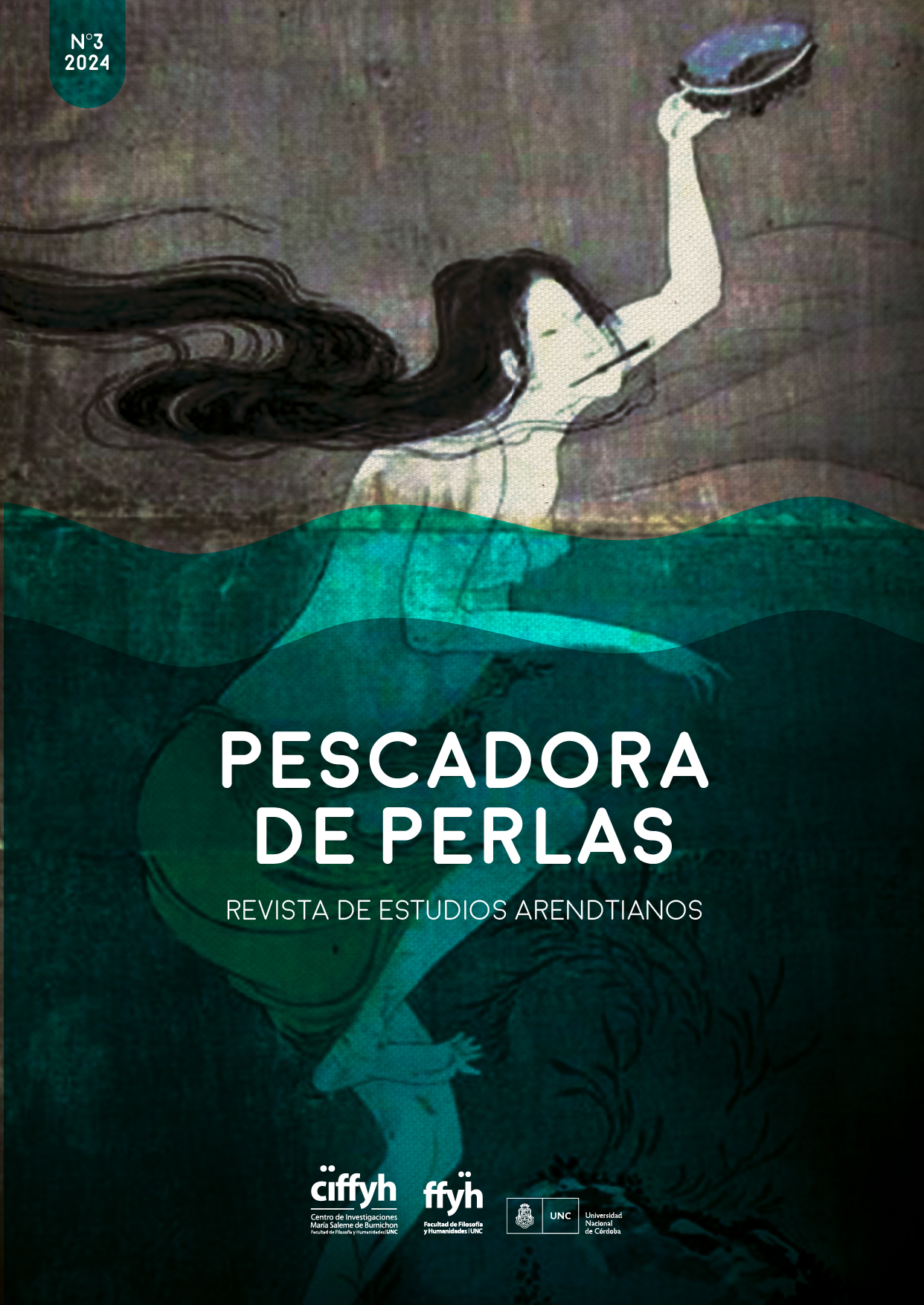Epifanias do político
Palavras-chave:
identidade, pluralidade, ação política, debates feministasResumo
A política, tal como Hannah Arendt a entende, adquire um carácter eminentemente existencial. Fundamentada no factum da pluralidade humana, ajuda a postular um quadro ontológico plural para a teorização feminista e a repensar uma esfera pública entendida como a recuperação do “entre” que, em última análise, molda o mundo. O espaço político transcende a lógica utilitária e não se identifica com nenhum lugar específico; é um espaço de visibilidade e reconhecimento entre um e outro, sem eliminar as diferenças que os separam, permitindo-lhes adquirir a sua própria identidade, bem como albergar novas manifestações do político. Este artigo debruça-se especificamente sobre as reflexões sobre a diferença ou alteridade, neste caso judaica, e as virtualidades que o anti-essencialismo na sua teoria da ação oferece para pensar uma praxis política feminista alinhada com os princípios democráticos e não baseada no binarismo de género. Ambas as questões estão intimamente relacionadas. Começaremos com uma breve abordagem ao “facto político”, tal como Arendt o concebe, e depois investigaremos os debates feministas sobre a diferença e a ação política.
Referências
Arendt, H. (1996). Entre el pasado y el futuro: Ocho ejercicios sobre la reflexión política. Península.
Arendt, H. (2002). La vida del espíritu. Paidós.
Arendt, H. (2005). La Condición Humana. Paidós.
Arendt, H. (2009). Sobre la revolución. Alianza.
Arendt, H. (2010a). Los Orígenes del Totalitarismo. Alianza.
Arendt, H. (2010b). Lo que quiero es comprender. Sobre mi vida y mi obra. Trotta.
Allen, A. (1999). Solidarity after identity politics: Hannah Arendt and the power of feminist theory. Philosophy & Social Criticism, 25(1), 97-118.
Allen, A. (2016). Emancipación sin utopía: Sometimiento, modernidad y las reivindicaciones normativas de la crítica feminista. Signos Filosóficos, 18(35), 170-196.
Bar On, B. A. (1996). Women in dark times: Rahel Varnhagen, Rosa Luxemburg, Hannah Arendt and me. En May, L. and Khon, J. (ed.), Hannah Arendt. twenty years later, (pp. 70-112). The MitPress.
Bar On, B. A. (2002). The subject of violence: Arendtean exercises in understanding. Rowman & Littlefield.
Birulés, F. (2007). Algunas observaciones sobre identidad y diferencias. Cuaderno Gris 9, Época III, 239-242.
Brown, W. (2019). In the Ruins of Neoliberalism. The Rise of Antidemocratic Politics in the West. Columbia University Press.
Brown, W. (2015). Undoing the Demos: Neoliberalism's Stealth Revolution. ZONE BOOKS.
Cavarero, A. (2021). Piazze Politiche. Corpi Radunati e Pluralitá. Filosofía Política, 1, 89-102.
Cutting‐Gray, J. (1993). Hannah Arendt, feminism, and the politics of alterity: “What will we lose if we win?” Hypatia, 8 (1), 35-54.
Dietz, M. G. (1995). Feminist Receptions of Hannah Arendt. En Honig, B. (ed.). Feminist interpretations of Hannah Arendt, (pp.17-50). University Press.
Disch, L. J. (1994). Hannah Arendt and The Limits of Philosophy. Cornell University Press.
Disch, L. J. (1995). On Friendship in “Dark Times”. En Honig, B. (ed.). Feminist Interpretations of Hannah Arendt, (pp. 285-311). University Press.
Honig, B. (1993). Political theory and the displacement of politics. Cornell Univ. Press.
Honig, B. (1995). Towar an agonistic feminism: Hannah Arendt and the politics of identity. En Honig, B. (ed.). Feminist interpretations of Hanna Arendt (pp. 135-166). Pennsylvania State University Press.
Huzar T. J. (2021). Violence, Vulnerability, Ontology. Insurrectionary Humanism in Cavarero and Butler. En Huzar, T. J., Woodford, C. (eds.) Toward a Feminist Ethics of Nonviolence. Adriana Cavarero, with Judith Butler, Bonnie Honig, and Other Voices, (pp. 151-160). Fordham University Press.
Leibovici, M. (2020). Acción. En Fuster, A. (ed.). Reflexiones para Fina Birulés, (10-28). Icaria.
Maslin, K. (2013). The Gender‐Neutral feminism of Hannah Arendt. Hypatia, 28 (3), 585-601.
Maslin, K. (2020). The experiential ontology of Hannah Arendt. Rowman & Littlefield.
O'Brien, M. (1981). The Politics of Reproduction. Routledge and Kegan Paul.
Pirro, R. (2001). Tragic Reconciliation. Northern Illinois University Press.
Portas Pérez, T. (2022). Derivas contemporáneas del pensamiento político de Hannah Arendt. Differenz. Revista Internacional De Estudios Heideggerianos Y Sus Derivas contemporáneas, (8), 139–153.
Pitkin, H. (1998). The Attack of the Blob: Hannah Arendt’s Concept of the Social. University of Chicago Press.
Rich, A. (1979). On Lies, Secrets and Silence: Selected Prose 1966-1978. W. W. Norton.
Rühle-Gerstel, A. (1932). Das Frauenproblem der Gegenwart-Eine psychologische Bilanz. Hirzel.
Tsao, R. (2002). Arendt against Athens. Rereading The Human Condition, Political Theory, Vol. 30 No. 1, pp. 97-123.
Villa, Dana, R. (1995). Arendt and Heidegger. The fate of the political. Princeton UP.
Downloads
Publicado
Edição
Seção
Licença
Copyright (c) 2024 Teresa Portas Pérez

Este trabalho está licenciado sob uma licença Creative Commons Attribution-NonCommercial-ShareAlike 4.0 International License.
Consultar los Avisos de derecho de autor. Aquellos autores/as que tengan publicaciones con esta revista, aceptan los términos siguientes:
- Los/as autores/as conservarán sus derechos de autor sobre el texto, y garantizarán a la revista el derecho de primera publicación, el cual estará simultáneamente sujeto a la Licencia de reconocimiento de Creative Commons: Atribución – No Comercial – Compartir Igual (by-nc-sa); no se permite un uso comercial de la obra original ni de las posibles obras derivadas, la distribución de las cuales se debe hacer con una licencia igual a la que regula la obra original.
- Después de la publicación, los trabajos podrán ser reproducidos por los autores en otros medios siempre que no se omita la indicación de la publicación original en esta revista. En este sentido, los autores/as podrán adoptar otros acuerdos de licencia no exclusiva de distribución de la versión de la obra publicada (p. ej.: al depositarla en un archivo institucional o publicarla en un volumen monográfico) siempre que se indique la publicación inicial en Pescadora de Perlas.
- La cesión de derechos de primera publicación de los/as autores otorga a Pescadora de Perlas autorización para que el trabajo sea colocado en el repositorio institucional de la Universidad Nacional de Córdoba y difundido a través de las bases de datos.



